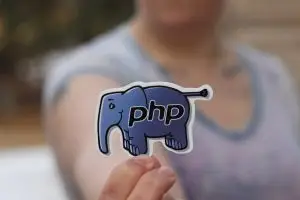Laravel: The Powerhouse of Modern PHP Development
In the ever-evolving landscape of web development, choosing the right framework is crucial for building robust and efficient applications. Laravel, an open-source PHP framework, has emerged as a dominant force, empowering developers to create modern, scalable, and secure web applications with ease.
Laravel’s popularity stems from its elegant syntax, robust features, and active community, making it an ideal choice for both beginners and experienced developers. It follows the Model-View-Controller (MVC) architectural pattern, promoting code organization and maintainability, while providing a comprehensive ecosystem of tools and libraries.
This article will delve into the intricacies of Laravel, exploring its key features, benefits, and its place within the PHP ecosystem. We will also discuss why it’s become a go-to framework for building modern web applications, and how it empowers developers to deliver exceptional user experiences.
Laravel’s Core Features: A Foundation for Excellence
Laravel boasts a wealth of features that streamline web development and enhance the overall development experience. Let’s explore some of its core functionalities:
– **Eloquent ORM:** Laravel’s Eloquent Object-Relational Mapper (ORM) simplifies database interactions. It allows developers to interact with databases using an intuitive, object-oriented approach, eliminating the need for complex SQL queries. This abstraction layer makes database management more efficient and reduces code complexity. For example, instead of writing raw SQL statements to retrieve data, developers can use Eloquent’s fluent interface to perform queries like `User::where(‘name’, ‘John’)->first();`. This approach not only improves readability but also makes the code more maintainable and less prone to errors.
– **Blade Templating Engine:** Laravel’s Blade templating engine provides a simple yet powerful way to create dynamic views. Its syntax is clean and expressive, allowing developers to focus on building the user interface without being bogged down by complex templating logic. Blade also offers features like template inheritance, sections, and directives, making it highly flexible and adaptable. For instance, you can easily create reusable layouts and partials, reducing code duplication and promoting consistency across your application’s views. Blade’s directives, such as `@if`, `@for`, and `@foreach`, allow for seamless integration of logic within your templates, making them more dynamic and responsive.
– **Artisan Console:** Laravel’s Artisan command-line interface provides a powerful set of tools for managing and automating tasks. It offers a wide range of commands for tasks like database migrations, seeding, model generation, and more. Artisan’s commands streamline common development workflows, saving developers time and effort. For example, you can use `php artisan make:model User` to generate a new model class, or `php artisan migrate` to apply database migrations to your application. This command-line interface simplifies repetitive tasks and enhances the overall development experience.
The Laravel Ecosystem: A World of Possibilities
Beyond its core features, Laravel benefits from a vibrant and supportive ecosystem. This ecosystem encompasses a wide range of packages, libraries, and tools that extend its functionality and cater to diverse development needs.
– **Package Manager:** Composer, Laravel’s package manager, simplifies the process of incorporating third-party libraries and dependencies into your projects. It allows you to easily find, install, and manage packages, fostering a collaborative development environment. Composer’s vast repository of packages provides access to a wide range of functionalities, from authentication and authorization to payment processing and email integration. This allows developers to leverage pre-built solutions, reducing development time and effort. For example, you can easily add social login functionality to your application by installing the `laravel/socialite` package using Composer.
– **Community Support:** Laravel has a large and active community of developers who contribute to its growth and support each other through forums, documentation, and online resources. This collective expertise provides invaluable assistance for solving problems, learning new techniques, and staying up-to-date with the latest advancements. The Laravel community is known for its helpfulness and willingness to share knowledge. You can find answers to your questions, get support for your projects, and learn from experienced developers through various online platforms like the Laravel forums, Stack Overflow, and the Laravel community Slack channel.
– **Testing Framework:** Laravel’s built-in testing framework makes it easy to write unit, feature, and integration tests for your application. This comprehensive testing suite ensures that your code is robust, reliable, and free from bugs. Laravel’s testing framework provides a wide range of tools for creating and running tests, including PHPUnit integration, mock objects, and database seeding. This allows developers to write comprehensive tests that cover various aspects of their application, ensuring its quality and stability.
Why Choose Laravel: The Advantages of a Powerful Framework
Laravel’s appeal lies in its numerous advantages that make it a compelling choice for web development projects. These advantages include:
– **Faster Development:** Laravel’s robust features and intuitive syntax accelerate the development process, allowing developers to build applications more efficiently. Its comprehensive ecosystem provides readily available solutions, reducing the time and effort required for common tasks. A study by Stack Overflow [1] found that Laravel developers reported significantly higher satisfaction levels with their development experience compared to developers using other frameworks. This suggests that Laravel’s features and ecosystem contribute to a more efficient and enjoyable development process.
– **Enhanced Security:** Laravel prioritizes security, offering features like built-in protection against common vulnerabilities, secure authentication mechanisms, and robust authorization controls. This focus on security ensures that applications built with Laravel are more resistant to attacks and data breaches. Laravel’s security features include built-in CSRF protection, SQL injection prevention, and secure password hashing. It also provides tools for implementing secure authentication and authorization, ensuring that only authorized users can access sensitive data and functionality.
– **Scalability and Performance:** Laravel is designed to handle high traffic and grow with your application’s needs. Its modular architecture allows for efficient scaling, while its performance optimizations ensure smooth operation even under heavy workloads. Laravel’s caching mechanisms, efficient database queries, and use of optimized libraries contribute to its performance. Its modular architecture allows developers to easily scale their applications by adding new features and functionalities without impacting existing code. This makes Laravel suitable for projects of all sizes, from small startups to large enterprises.
– **Strong Community Support:** Laravel’s active community provides ongoing support, updates, and valuable resources, making it easier to learn the framework and troubleshoot issues. This strong community fosters a collaborative environment where developers can share knowledge and best practices. The Laravel community is known for its responsiveness and willingness to help. Developers can find answers to their questions, get support for their projects, and learn from experienced developers through various online platforms like the Laravel forums, Stack Overflow, and the Laravel community Slack channel. This strong community support makes Laravel a great choice for both beginners and experienced developers.
In conclusion, Laravel has undeniably established itself as a leading force within the PHP development landscape. Its comprehensive feature set, elegant syntax, and robust ecosystem have made it a highly sought-after framework for developers of all experience levels. Laravel’s commitment to developer productivity and application scalability is evident in its carefully crafted design, which prioritizes clean code, efficient workflows, and a seamless development experience.
One of Laravel’s key strengths lies in its intuitive Object-Relational Mapper (ORM), Eloquent. Eloquent simplifies database interactions by providing an expressive and elegant syntax for querying, creating, updating, and deleting data. This abstraction layer allows developers to focus on application logic rather than getting bogged down in complex SQL queries. For instance, retrieving all users with a specific role can be achieved with a single line of code using Eloquent, significantly reducing development time and effort.
Beyond its core features, Laravel boasts a vibrant and active community that contributes to its ongoing development and provides invaluable support to developers. This community fosters a collaborative environment where developers can share knowledge, seek assistance, and contribute to the framework’s growth. The Laravel ecosystem also offers a wide range of packages and extensions that extend its functionality and cater to diverse development needs. These packages, available through the official Laravel Packagist repository, provide readily available solutions for common tasks, such as authentication, authorization, and email management, further enhancing developer productivity.
Numerous successful projects have leveraged Laravel’s capabilities, demonstrating its effectiveness in building complex and scalable web applications. For example, the popular online learning platform, Laracasts, is built entirely on Laravel, showcasing the framework’s ability to handle large amounts of data, user interactions, and complex workflows. Similarly, the social networking platform, Flarum, utilizes Laravel’s robust features to power its user-centric platform. These case studies highlight Laravel’s versatility and its suitability for a wide range of web development projects, from small-scale startups to large-scale enterprise applications.
In summary, Laravel’s combination of elegant design, powerful features, and a supportive community makes it an exceptional choice for modern web development. Its commitment to developer productivity, application security, and scalability ensures that developers can build high-quality web applications with ease and efficiency. Whether you’re a seasoned developer or just starting your journey, Laravel offers a comprehensive and empowering framework that can help you achieve your web development goals.

Photo by Image Hunter on Pexels








Thank you for your sharing. I am worried that I lack creative ideas. It is your article that makes me full of hope. Thank you. But, I have a question, can you help me?
I don’t think the title of your article matches the content lol. Just kidding, mainly because I had some doubts after reading the article.
Your article helped me a lot, is there any more related content? Thanks!